Comprehensive Marketing Management Report: Travelodge Case Study
VerifiedAdded on 2021/11/05
|11
|2796
|22
Report
AI Summary
This report provides a comprehensive analysis of Travelodge's marketing management. It begins with an overview of the company and its services, followed by an examination of its marketing management orientations, including its customer-centric approach and brand value. The report then delves into the marketing environment, considering both legal and technological factors, along with an internal SWOT analysis highlighting Travelodge's strengths, weaknesses, opportunities, and threats. The core of the report focuses on Travelodge's marketing strategies, including its target audience, positioning, and the 4Ps of the marketing mix (product, price, promotion, and place). The report explores various positioning strategies, such as reverse and breakaway positioning, and concludes by summarizing the key findings and emphasizing Travelodge's success in the budget hotel market. The report is a detailed case study of Travelodge’s marketing and provides useful insights into the company's strategies.
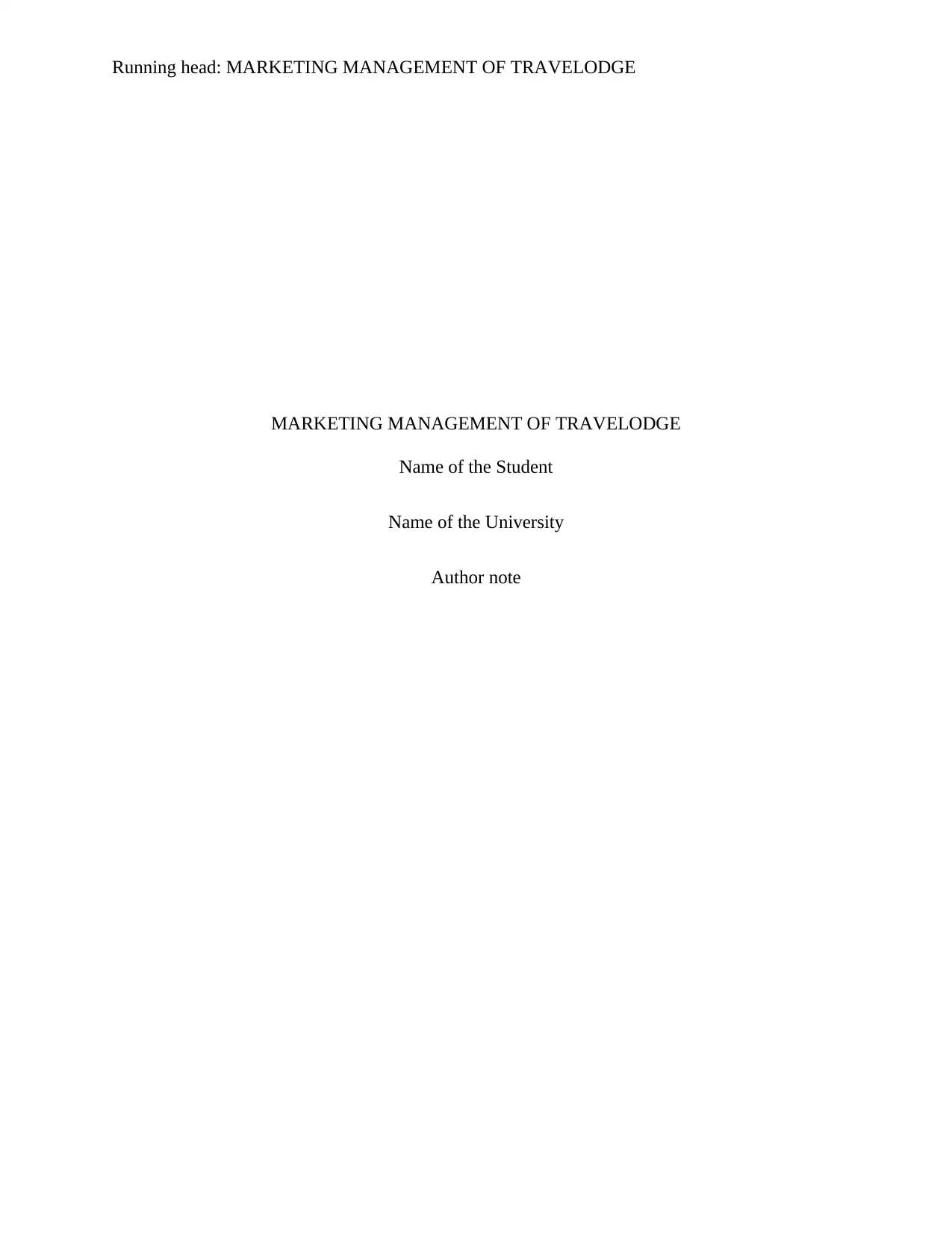
Running head: MARKETING MANAGEMENT OF TRAVELODGE
MARKETING MANAGEMENT OF TRAVELODGE
Name of the Student
Name of the University
Author note
MARKETING MANAGEMENT OF TRAVELODGE
Name of the Student
Name of the University
Author note
Paraphrase This Document
Need a fresh take? Get an instant paraphrase of this document with our AI Paraphraser
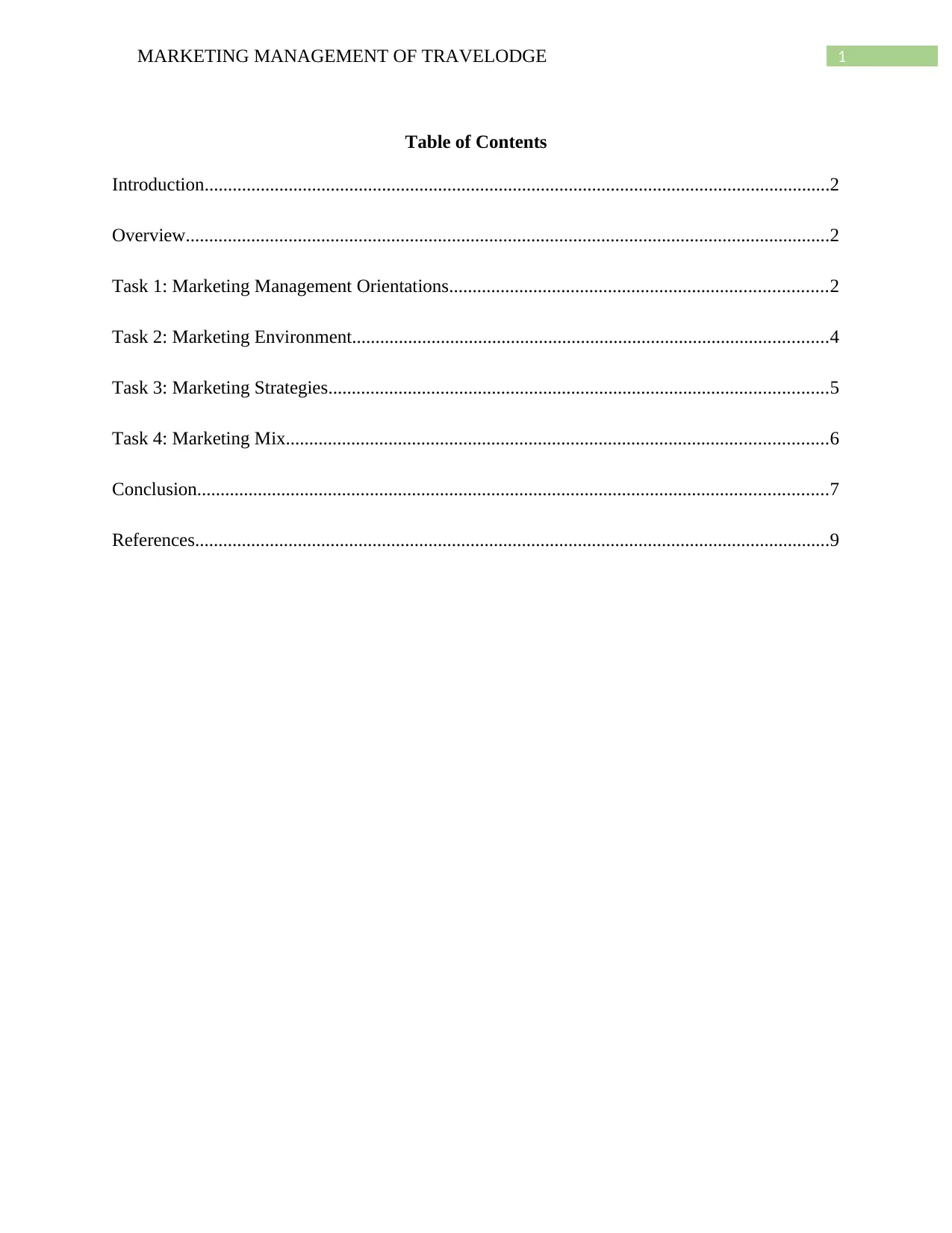
1MARKETING MANAGEMENT OF TRAVELODGE
Table of Contents
Introduction......................................................................................................................................2
Overview..........................................................................................................................................2
Task 1: Marketing Management Orientations.................................................................................2
Task 2: Marketing Environment......................................................................................................4
Task 3: Marketing Strategies...........................................................................................................5
Task 4: Marketing Mix....................................................................................................................6
Conclusion.......................................................................................................................................7
References........................................................................................................................................9
Table of Contents
Introduction......................................................................................................................................2
Overview..........................................................................................................................................2
Task 1: Marketing Management Orientations.................................................................................2
Task 2: Marketing Environment......................................................................................................4
Task 3: Marketing Strategies...........................................................................................................5
Task 4: Marketing Mix....................................................................................................................6
Conclusion.......................................................................................................................................7
References........................................................................................................................................9
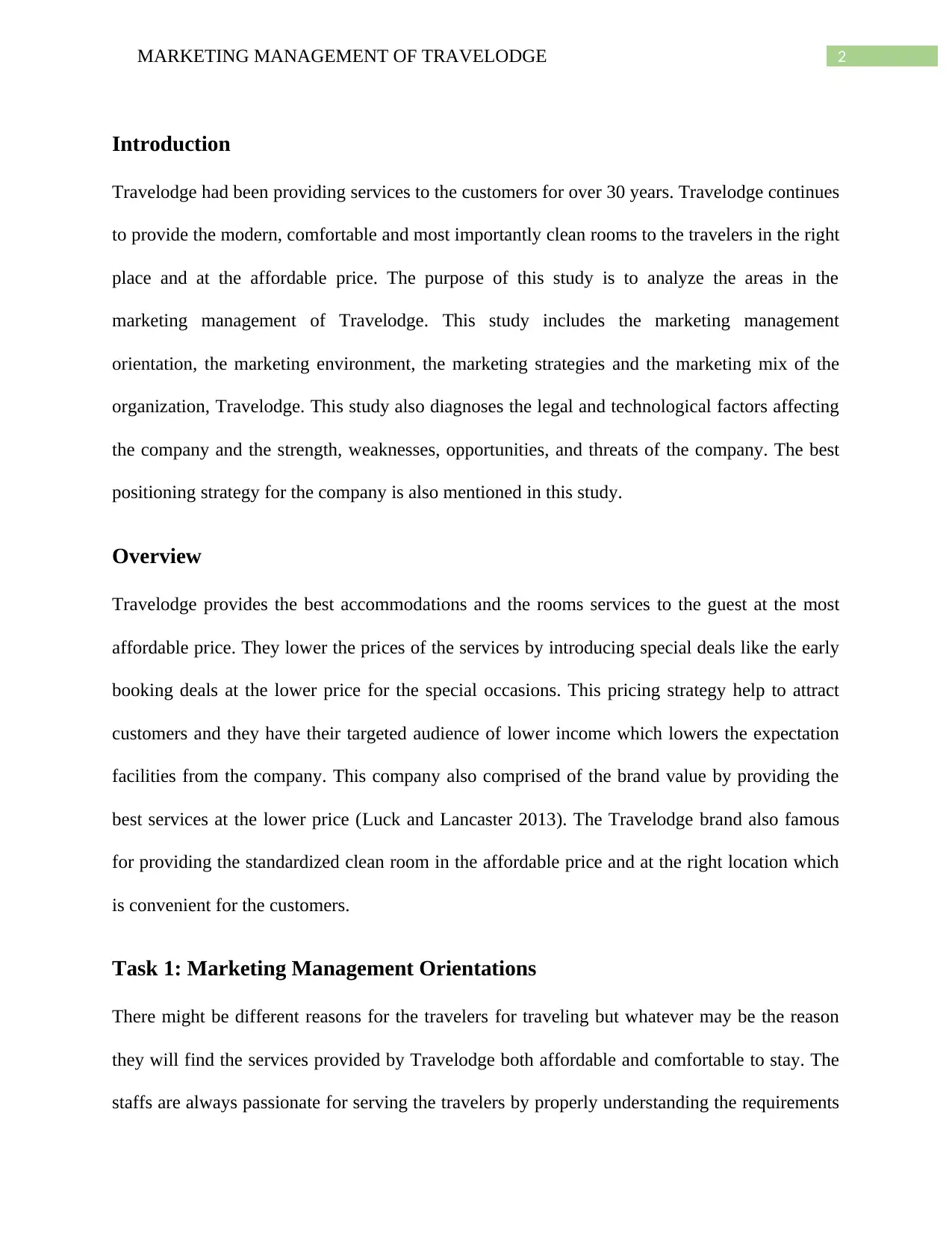
2MARKETING MANAGEMENT OF TRAVELODGE
Introduction
Travelodge had been providing services to the customers for over 30 years. Travelodge continues
to provide the modern, comfortable and most importantly clean rooms to the travelers in the right
place and at the affordable price. The purpose of this study is to analyze the areas in the
marketing management of Travelodge. This study includes the marketing management
orientation, the marketing environment, the marketing strategies and the marketing mix of the
organization, Travelodge. This study also diagnoses the legal and technological factors affecting
the company and the strength, weaknesses, opportunities, and threats of the company. The best
positioning strategy for the company is also mentioned in this study.
Overview
Travelodge provides the best accommodations and the rooms services to the guest at the most
affordable price. They lower the prices of the services by introducing special deals like the early
booking deals at the lower price for the special occasions. This pricing strategy help to attract
customers and they have their targeted audience of lower income which lowers the expectation
facilities from the company. This company also comprised of the brand value by providing the
best services at the lower price (Luck and Lancaster 2013). The Travelodge brand also famous
for providing the standardized clean room in the affordable price and at the right location which
is convenient for the customers.
Task 1: Marketing Management Orientations
There might be different reasons for the travelers for traveling but whatever may be the reason
they will find the services provided by Travelodge both affordable and comfortable to stay. The
staffs are always passionate for serving the travelers by properly understanding the requirements
Introduction
Travelodge had been providing services to the customers for over 30 years. Travelodge continues
to provide the modern, comfortable and most importantly clean rooms to the travelers in the right
place and at the affordable price. The purpose of this study is to analyze the areas in the
marketing management of Travelodge. This study includes the marketing management
orientation, the marketing environment, the marketing strategies and the marketing mix of the
organization, Travelodge. This study also diagnoses the legal and technological factors affecting
the company and the strength, weaknesses, opportunities, and threats of the company. The best
positioning strategy for the company is also mentioned in this study.
Overview
Travelodge provides the best accommodations and the rooms services to the guest at the most
affordable price. They lower the prices of the services by introducing special deals like the early
booking deals at the lower price for the special occasions. This pricing strategy help to attract
customers and they have their targeted audience of lower income which lowers the expectation
facilities from the company. This company also comprised of the brand value by providing the
best services at the lower price (Luck and Lancaster 2013). The Travelodge brand also famous
for providing the standardized clean room in the affordable price and at the right location which
is convenient for the customers.
Task 1: Marketing Management Orientations
There might be different reasons for the travelers for traveling but whatever may be the reason
they will find the services provided by Travelodge both affordable and comfortable to stay. The
staffs are always passionate for serving the travelers by properly understanding the requirements
⊘ This is a preview!⊘
Do you want full access?
Subscribe today to unlock all pages.

Trusted by 1+ million students worldwide
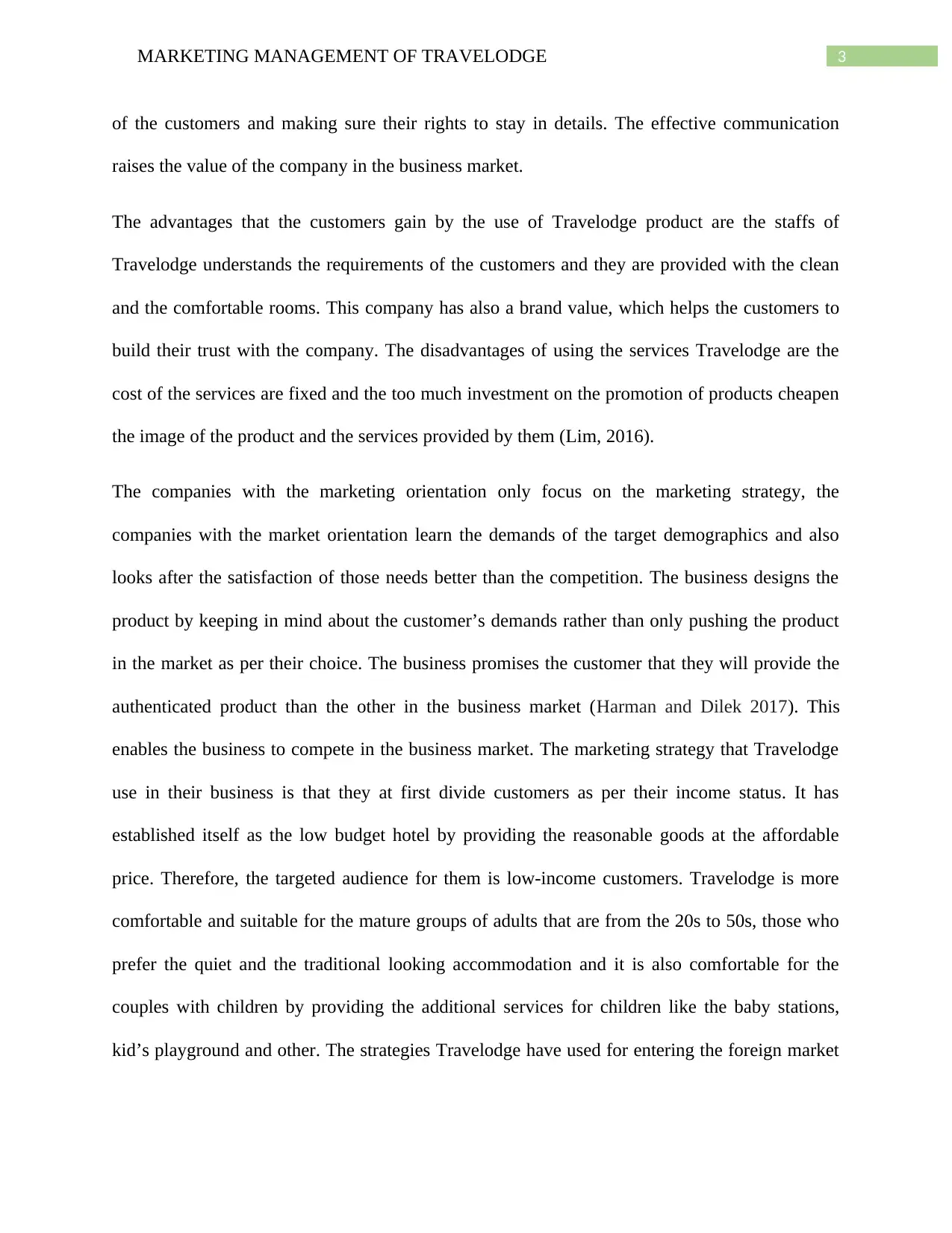
3MARKETING MANAGEMENT OF TRAVELODGE
of the customers and making sure their rights to stay in details. The effective communication
raises the value of the company in the business market.
The advantages that the customers gain by the use of Travelodge product are the staffs of
Travelodge understands the requirements of the customers and they are provided with the clean
and the comfortable rooms. This company has also a brand value, which helps the customers to
build their trust with the company. The disadvantages of using the services Travelodge are the
cost of the services are fixed and the too much investment on the promotion of products cheapen
the image of the product and the services provided by them (Lim, 2016).
The companies with the marketing orientation only focus on the marketing strategy, the
companies with the market orientation learn the demands of the target demographics and also
looks after the satisfaction of those needs better than the competition. The business designs the
product by keeping in mind about the customer’s demands rather than only pushing the product
in the market as per their choice. The business promises the customer that they will provide the
authenticated product than the other in the business market (Harman and Dilek 2017). This
enables the business to compete in the business market. The marketing strategy that Travelodge
use in their business is that they at first divide customers as per their income status. It has
established itself as the low budget hotel by providing the reasonable goods at the affordable
price. Therefore, the targeted audience for them is low-income customers. Travelodge is more
comfortable and suitable for the mature groups of adults that are from the 20s to 50s, those who
prefer the quiet and the traditional looking accommodation and it is also comfortable for the
couples with children by providing the additional services for children like the baby stations,
kid’s playground and other. The strategies Travelodge have used for entering the foreign market
of the customers and making sure their rights to stay in details. The effective communication
raises the value of the company in the business market.
The advantages that the customers gain by the use of Travelodge product are the staffs of
Travelodge understands the requirements of the customers and they are provided with the clean
and the comfortable rooms. This company has also a brand value, which helps the customers to
build their trust with the company. The disadvantages of using the services Travelodge are the
cost of the services are fixed and the too much investment on the promotion of products cheapen
the image of the product and the services provided by them (Lim, 2016).
The companies with the marketing orientation only focus on the marketing strategy, the
companies with the market orientation learn the demands of the target demographics and also
looks after the satisfaction of those needs better than the competition. The business designs the
product by keeping in mind about the customer’s demands rather than only pushing the product
in the market as per their choice. The business promises the customer that they will provide the
authenticated product than the other in the business market (Harman and Dilek 2017). This
enables the business to compete in the business market. The marketing strategy that Travelodge
use in their business is that they at first divide customers as per their income status. It has
established itself as the low budget hotel by providing the reasonable goods at the affordable
price. Therefore, the targeted audience for them is low-income customers. Travelodge is more
comfortable and suitable for the mature groups of adults that are from the 20s to 50s, those who
prefer the quiet and the traditional looking accommodation and it is also comfortable for the
couples with children by providing the additional services for children like the baby stations,
kid’s playground and other. The strategies Travelodge have used for entering the foreign market
Paraphrase This Document
Need a fresh take? Get an instant paraphrase of this document with our AI Paraphraser
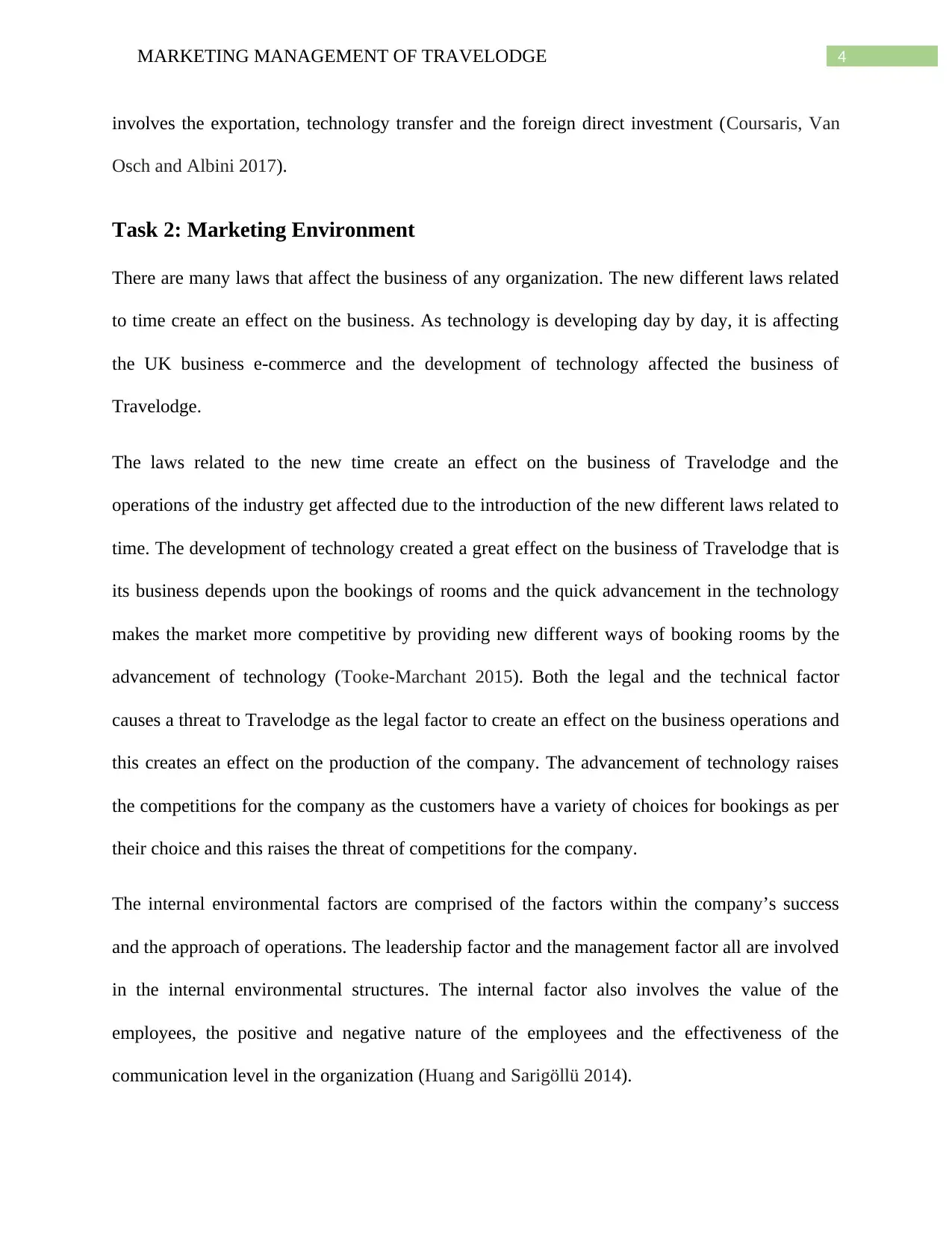
4MARKETING MANAGEMENT OF TRAVELODGE
involves the exportation, technology transfer and the foreign direct investment (Coursaris, Van
Osch and Albini 2017).
Task 2: Marketing Environment
There are many laws that affect the business of any organization. The new different laws related
to time create an effect on the business. As technology is developing day by day, it is affecting
the UK business e-commerce and the development of technology affected the business of
Travelodge.
The laws related to the new time create an effect on the business of Travelodge and the
operations of the industry get affected due to the introduction of the new different laws related to
time. The development of technology created a great effect on the business of Travelodge that is
its business depends upon the bookings of rooms and the quick advancement in the technology
makes the market more competitive by providing new different ways of booking rooms by the
advancement of technology (Tooke-Marchant 2015). Both the legal and the technical factor
causes a threat to Travelodge as the legal factor to create an effect on the business operations and
this creates an effect on the production of the company. The advancement of technology raises
the competitions for the company as the customers have a variety of choices for bookings as per
their choice and this raises the threat of competitions for the company.
The internal environmental factors are comprised of the factors within the company’s success
and the approach of operations. The leadership factor and the management factor all are involved
in the internal environmental structures. The internal factor also involves the value of the
employees, the positive and negative nature of the employees and the effectiveness of the
communication level in the organization (Huang and Sarigöllü 2014).
involves the exportation, technology transfer and the foreign direct investment (Coursaris, Van
Osch and Albini 2017).
Task 2: Marketing Environment
There are many laws that affect the business of any organization. The new different laws related
to time create an effect on the business. As technology is developing day by day, it is affecting
the UK business e-commerce and the development of technology affected the business of
Travelodge.
The laws related to the new time create an effect on the business of Travelodge and the
operations of the industry get affected due to the introduction of the new different laws related to
time. The development of technology created a great effect on the business of Travelodge that is
its business depends upon the bookings of rooms and the quick advancement in the technology
makes the market more competitive by providing new different ways of booking rooms by the
advancement of technology (Tooke-Marchant 2015). Both the legal and the technical factor
causes a threat to Travelodge as the legal factor to create an effect on the business operations and
this creates an effect on the production of the company. The advancement of technology raises
the competitions for the company as the customers have a variety of choices for bookings as per
their choice and this raises the threat of competitions for the company.
The internal environmental factors are comprised of the factors within the company’s success
and the approach of operations. The leadership factor and the management factor all are involved
in the internal environmental structures. The internal factor also involves the value of the
employees, the positive and negative nature of the employees and the effectiveness of the
communication level in the organization (Huang and Sarigöllü 2014).
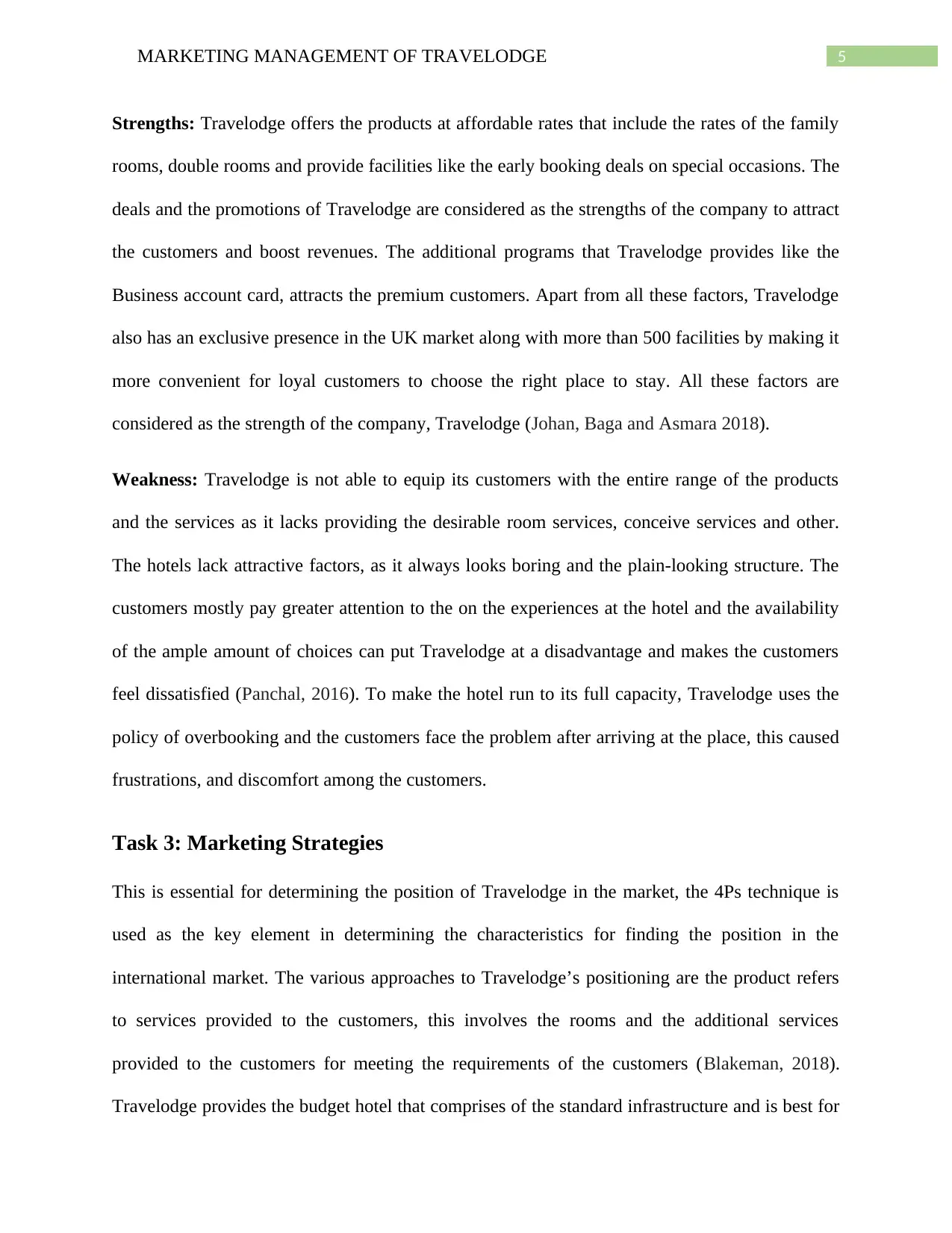
5MARKETING MANAGEMENT OF TRAVELODGE
Strengths: Travelodge offers the products at affordable rates that include the rates of the family
rooms, double rooms and provide facilities like the early booking deals on special occasions. The
deals and the promotions of Travelodge are considered as the strengths of the company to attract
the customers and boost revenues. The additional programs that Travelodge provides like the
Business account card, attracts the premium customers. Apart from all these factors, Travelodge
also has an exclusive presence in the UK market along with more than 500 facilities by making it
more convenient for loyal customers to choose the right place to stay. All these factors are
considered as the strength of the company, Travelodge (Johan, Baga and Asmara 2018).
Weakness: Travelodge is not able to equip its customers with the entire range of the products
and the services as it lacks providing the desirable room services, conceive services and other.
The hotels lack attractive factors, as it always looks boring and the plain-looking structure. The
customers mostly pay greater attention to the on the experiences at the hotel and the availability
of the ample amount of choices can put Travelodge at a disadvantage and makes the customers
feel dissatisfied (Panchal, 2016). To make the hotel run to its full capacity, Travelodge uses the
policy of overbooking and the customers face the problem after arriving at the place, this caused
frustrations, and discomfort among the customers.
Task 3: Marketing Strategies
This is essential for determining the position of Travelodge in the market, the 4Ps technique is
used as the key element in determining the characteristics for finding the position in the
international market. The various approaches to Travelodge’s positioning are the product refers
to services provided to the customers, this involves the rooms and the additional services
provided to the customers for meeting the requirements of the customers (Blakeman, 2018).
Travelodge provides the budget hotel that comprises of the standard infrastructure and is best for
Strengths: Travelodge offers the products at affordable rates that include the rates of the family
rooms, double rooms and provide facilities like the early booking deals on special occasions. The
deals and the promotions of Travelodge are considered as the strengths of the company to attract
the customers and boost revenues. The additional programs that Travelodge provides like the
Business account card, attracts the premium customers. Apart from all these factors, Travelodge
also has an exclusive presence in the UK market along with more than 500 facilities by making it
more convenient for loyal customers to choose the right place to stay. All these factors are
considered as the strength of the company, Travelodge (Johan, Baga and Asmara 2018).
Weakness: Travelodge is not able to equip its customers with the entire range of the products
and the services as it lacks providing the desirable room services, conceive services and other.
The hotels lack attractive factors, as it always looks boring and the plain-looking structure. The
customers mostly pay greater attention to the on the experiences at the hotel and the availability
of the ample amount of choices can put Travelodge at a disadvantage and makes the customers
feel dissatisfied (Panchal, 2016). To make the hotel run to its full capacity, Travelodge uses the
policy of overbooking and the customers face the problem after arriving at the place, this caused
frustrations, and discomfort among the customers.
Task 3: Marketing Strategies
This is essential for determining the position of Travelodge in the market, the 4Ps technique is
used as the key element in determining the characteristics for finding the position in the
international market. The various approaches to Travelodge’s positioning are the product refers
to services provided to the customers, this involves the rooms and the additional services
provided to the customers for meeting the requirements of the customers (Blakeman, 2018).
Travelodge provides the budget hotel that comprises of the standard infrastructure and is best for
⊘ This is a preview!⊘
Do you want full access?
Subscribe today to unlock all pages.

Trusted by 1+ million students worldwide
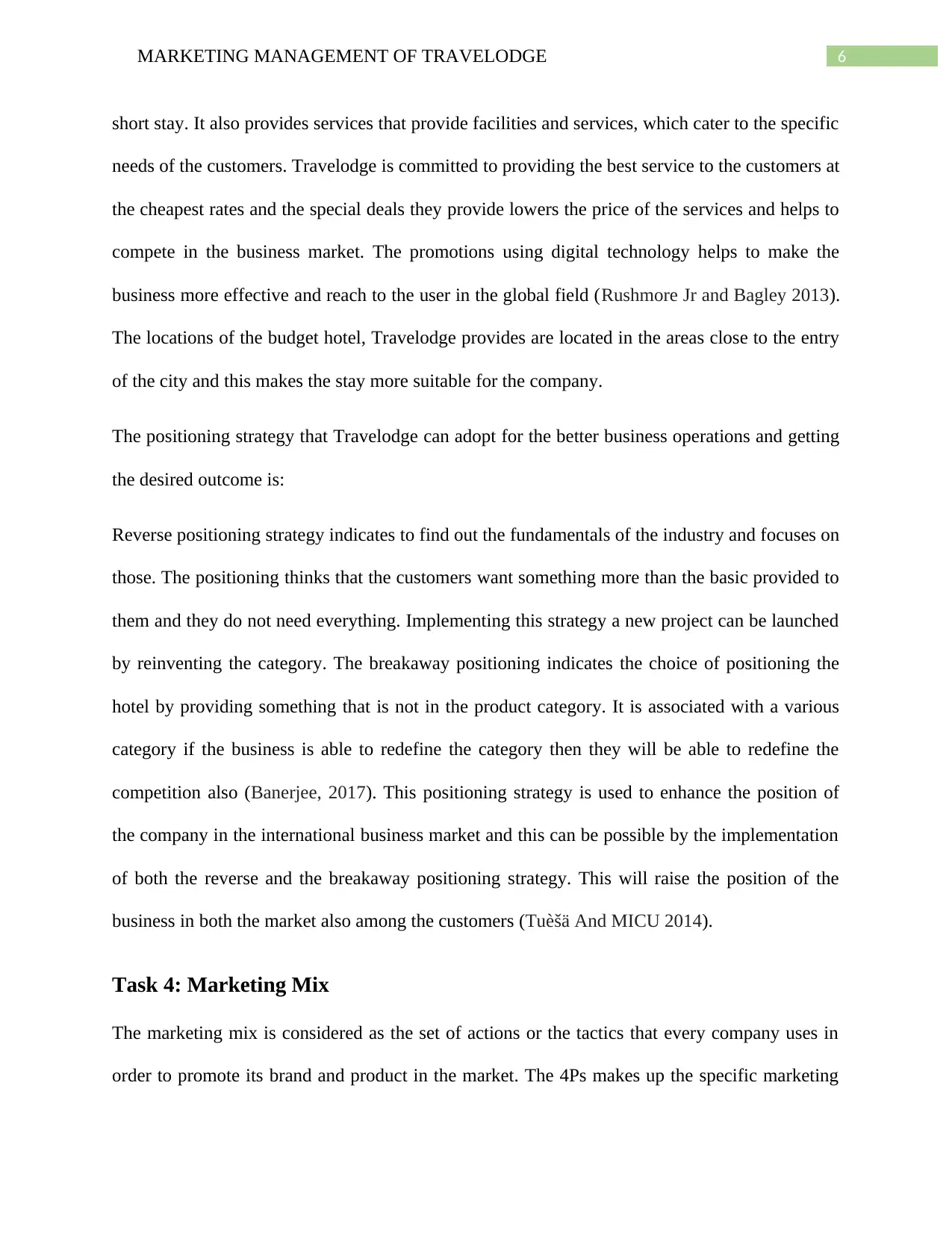
6MARKETING MANAGEMENT OF TRAVELODGE
short stay. It also provides services that provide facilities and services, which cater to the specific
needs of the customers. Travelodge is committed to providing the best service to the customers at
the cheapest rates and the special deals they provide lowers the price of the services and helps to
compete in the business market. The promotions using digital technology helps to make the
business more effective and reach to the user in the global field (Rushmore Jr and Bagley 2013).
The locations of the budget hotel, Travelodge provides are located in the areas close to the entry
of the city and this makes the stay more suitable for the company.
The positioning strategy that Travelodge can adopt for the better business operations and getting
the desired outcome is:
Reverse positioning strategy indicates to find out the fundamentals of the industry and focuses on
those. The positioning thinks that the customers want something more than the basic provided to
them and they do not need everything. Implementing this strategy a new project can be launched
by reinventing the category. The breakaway positioning indicates the choice of positioning the
hotel by providing something that is not in the product category. It is associated with a various
category if the business is able to redefine the category then they will be able to redefine the
competition also (Banerjee, 2017). This positioning strategy is used to enhance the position of
the company in the international business market and this can be possible by the implementation
of both the reverse and the breakaway positioning strategy. This will raise the position of the
business in both the market also among the customers (Tuèšä And MICU 2014).
Task 4: Marketing Mix
The marketing mix is considered as the set of actions or the tactics that every company uses in
order to promote its brand and product in the market. The 4Ps makes up the specific marketing
short stay. It also provides services that provide facilities and services, which cater to the specific
needs of the customers. Travelodge is committed to providing the best service to the customers at
the cheapest rates and the special deals they provide lowers the price of the services and helps to
compete in the business market. The promotions using digital technology helps to make the
business more effective and reach to the user in the global field (Rushmore Jr and Bagley 2013).
The locations of the budget hotel, Travelodge provides are located in the areas close to the entry
of the city and this makes the stay more suitable for the company.
The positioning strategy that Travelodge can adopt for the better business operations and getting
the desired outcome is:
Reverse positioning strategy indicates to find out the fundamentals of the industry and focuses on
those. The positioning thinks that the customers want something more than the basic provided to
them and they do not need everything. Implementing this strategy a new project can be launched
by reinventing the category. The breakaway positioning indicates the choice of positioning the
hotel by providing something that is not in the product category. It is associated with a various
category if the business is able to redefine the category then they will be able to redefine the
competition also (Banerjee, 2017). This positioning strategy is used to enhance the position of
the company in the international business market and this can be possible by the implementation
of both the reverse and the breakaway positioning strategy. This will raise the position of the
business in both the market also among the customers (Tuèšä And MICU 2014).
Task 4: Marketing Mix
The marketing mix is considered as the set of actions or the tactics that every company uses in
order to promote its brand and product in the market. The 4Ps makes up the specific marketing
Paraphrase This Document
Need a fresh take? Get an instant paraphrase of this document with our AI Paraphraser
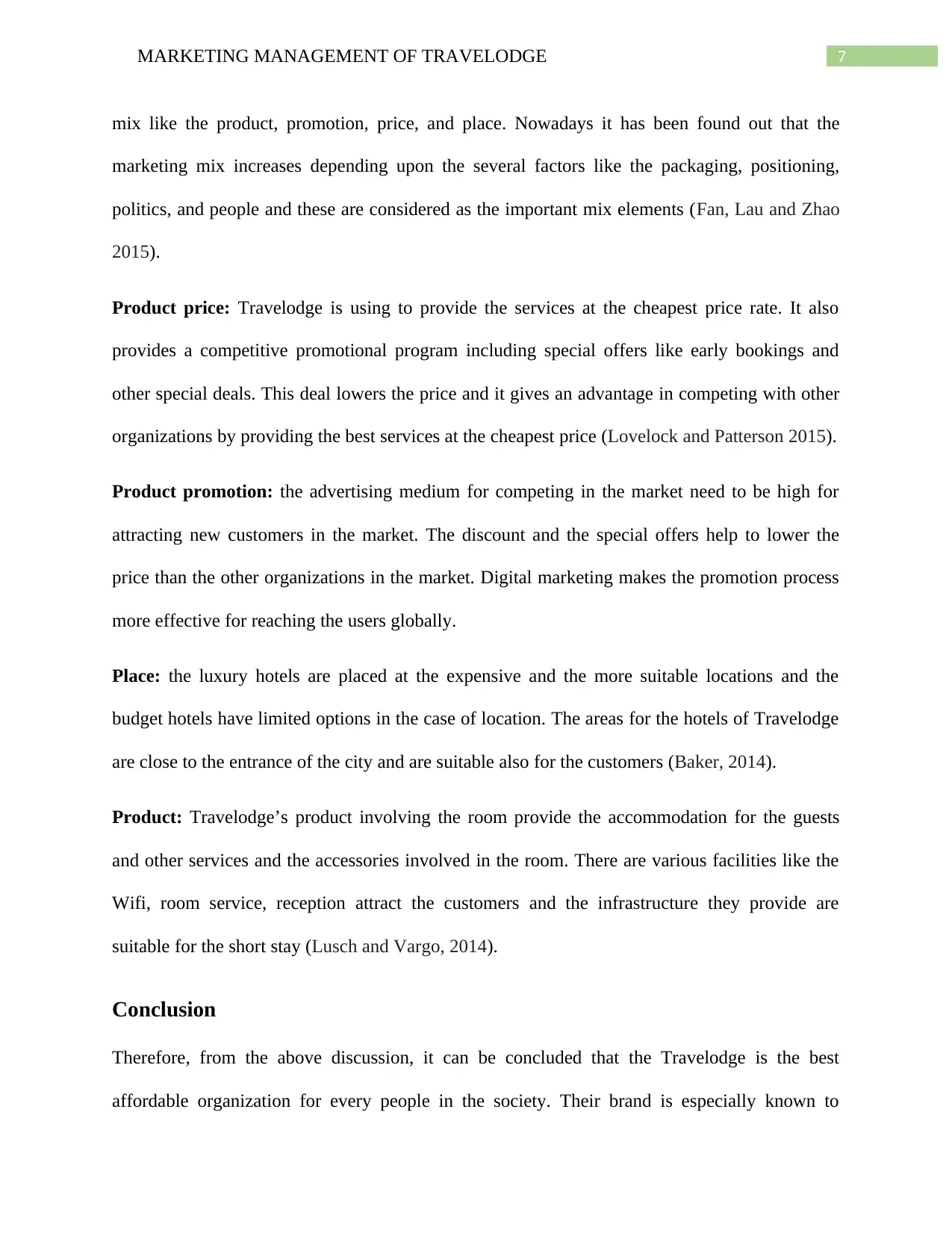
7MARKETING MANAGEMENT OF TRAVELODGE
mix like the product, promotion, price, and place. Nowadays it has been found out that the
marketing mix increases depending upon the several factors like the packaging, positioning,
politics, and people and these are considered as the important mix elements (Fan, Lau and Zhao
2015).
Product price: Travelodge is using to provide the services at the cheapest price rate. It also
provides a competitive promotional program including special offers like early bookings and
other special deals. This deal lowers the price and it gives an advantage in competing with other
organizations by providing the best services at the cheapest price (Lovelock and Patterson 2015).
Product promotion: the advertising medium for competing in the market need to be high for
attracting new customers in the market. The discount and the special offers help to lower the
price than the other organizations in the market. Digital marketing makes the promotion process
more effective for reaching the users globally.
Place: the luxury hotels are placed at the expensive and the more suitable locations and the
budget hotels have limited options in the case of location. The areas for the hotels of Travelodge
are close to the entrance of the city and are suitable also for the customers (Baker, 2014).
Product: Travelodge’s product involving the room provide the accommodation for the guests
and other services and the accessories involved in the room. There are various facilities like the
Wifi, room service, reception attract the customers and the infrastructure they provide are
suitable for the short stay (Lusch and Vargo, 2014).
Conclusion
Therefore, from the above discussion, it can be concluded that the Travelodge is the best
affordable organization for every people in the society. Their brand is especially known to
mix like the product, promotion, price, and place. Nowadays it has been found out that the
marketing mix increases depending upon the several factors like the packaging, positioning,
politics, and people and these are considered as the important mix elements (Fan, Lau and Zhao
2015).
Product price: Travelodge is using to provide the services at the cheapest price rate. It also
provides a competitive promotional program including special offers like early bookings and
other special deals. This deal lowers the price and it gives an advantage in competing with other
organizations by providing the best services at the cheapest price (Lovelock and Patterson 2015).
Product promotion: the advertising medium for competing in the market need to be high for
attracting new customers in the market. The discount and the special offers help to lower the
price than the other organizations in the market. Digital marketing makes the promotion process
more effective for reaching the users globally.
Place: the luxury hotels are placed at the expensive and the more suitable locations and the
budget hotels have limited options in the case of location. The areas for the hotels of Travelodge
are close to the entrance of the city and are suitable also for the customers (Baker, 2014).
Product: Travelodge’s product involving the room provide the accommodation for the guests
and other services and the accessories involved in the room. There are various facilities like the
Wifi, room service, reception attract the customers and the infrastructure they provide are
suitable for the short stay (Lusch and Vargo, 2014).
Conclusion
Therefore, from the above discussion, it can be concluded that the Travelodge is the best
affordable organization for every people in the society. Their brand is especially known to
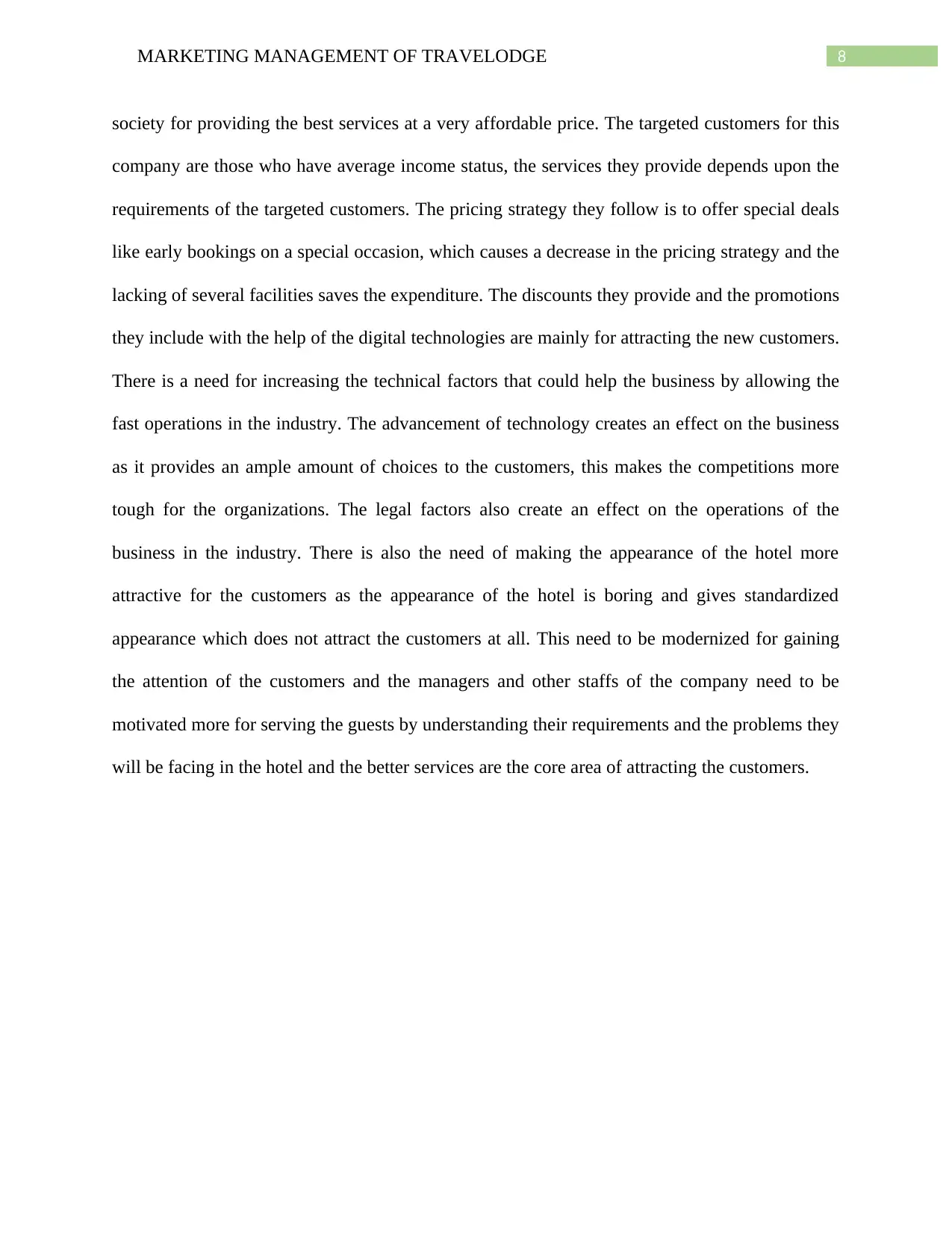
8MARKETING MANAGEMENT OF TRAVELODGE
society for providing the best services at a very affordable price. The targeted customers for this
company are those who have average income status, the services they provide depends upon the
requirements of the targeted customers. The pricing strategy they follow is to offer special deals
like early bookings on a special occasion, which causes a decrease in the pricing strategy and the
lacking of several facilities saves the expenditure. The discounts they provide and the promotions
they include with the help of the digital technologies are mainly for attracting the new customers.
There is a need for increasing the technical factors that could help the business by allowing the
fast operations in the industry. The advancement of technology creates an effect on the business
as it provides an ample amount of choices to the customers, this makes the competitions more
tough for the organizations. The legal factors also create an effect on the operations of the
business in the industry. There is also the need of making the appearance of the hotel more
attractive for the customers as the appearance of the hotel is boring and gives standardized
appearance which does not attract the customers at all. This need to be modernized for gaining
the attention of the customers and the managers and other staffs of the company need to be
motivated more for serving the guests by understanding their requirements and the problems they
will be facing in the hotel and the better services are the core area of attracting the customers.
society for providing the best services at a very affordable price. The targeted customers for this
company are those who have average income status, the services they provide depends upon the
requirements of the targeted customers. The pricing strategy they follow is to offer special deals
like early bookings on a special occasion, which causes a decrease in the pricing strategy and the
lacking of several facilities saves the expenditure. The discounts they provide and the promotions
they include with the help of the digital technologies are mainly for attracting the new customers.
There is a need for increasing the technical factors that could help the business by allowing the
fast operations in the industry. The advancement of technology creates an effect on the business
as it provides an ample amount of choices to the customers, this makes the competitions more
tough for the organizations. The legal factors also create an effect on the operations of the
business in the industry. There is also the need of making the appearance of the hotel more
attractive for the customers as the appearance of the hotel is boring and gives standardized
appearance which does not attract the customers at all. This need to be modernized for gaining
the attention of the customers and the managers and other staffs of the company need to be
motivated more for serving the guests by understanding their requirements and the problems they
will be facing in the hotel and the better services are the core area of attracting the customers.
⊘ This is a preview!⊘
Do you want full access?
Subscribe today to unlock all pages.

Trusted by 1+ million students worldwide
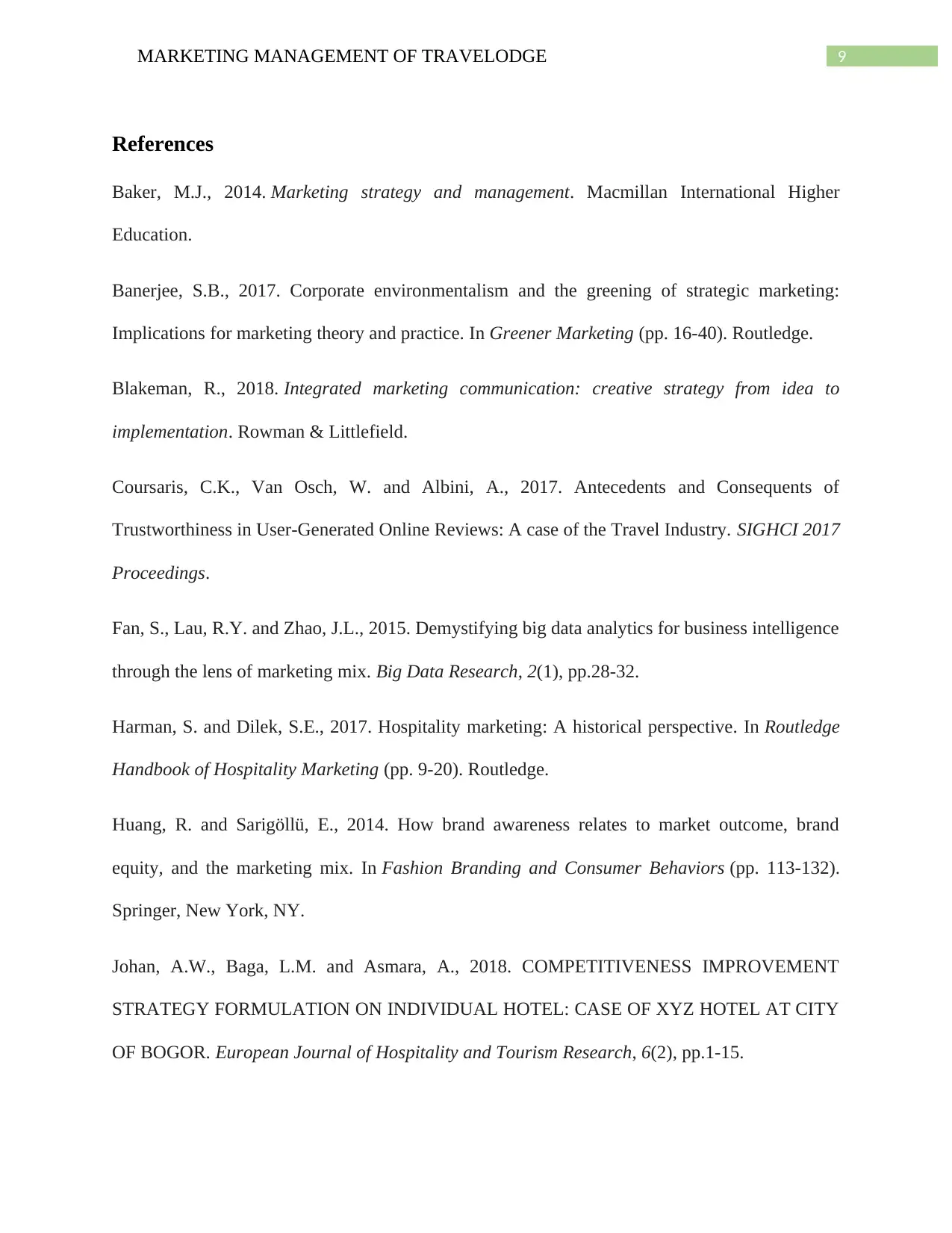
9MARKETING MANAGEMENT OF TRAVELODGE
References
Baker, M.J., 2014. Marketing strategy and management. Macmillan International Higher
Education.
Banerjee, S.B., 2017. Corporate environmentalism and the greening of strategic marketing:
Implications for marketing theory and practice. In Greener Marketing (pp. 16-40). Routledge.
Blakeman, R., 2018. Integrated marketing communication: creative strategy from idea to
implementation. Rowman & Littlefield.
Coursaris, C.K., Van Osch, W. and Albini, A., 2017. Antecedents and Consequents of
Trustworthiness in User-Generated Online Reviews: A case of the Travel Industry. SIGHCI 2017
Proceedings.
Fan, S., Lau, R.Y. and Zhao, J.L., 2015. Demystifying big data analytics for business intelligence
through the lens of marketing mix. Big Data Research, 2(1), pp.28-32.
Harman, S. and Dilek, S.E., 2017. Hospitality marketing: A historical perspective. In Routledge
Handbook of Hospitality Marketing (pp. 9-20). Routledge.
Huang, R. and Sarigöllü, E., 2014. How brand awareness relates to market outcome, brand
equity, and the marketing mix. In Fashion Branding and Consumer Behaviors (pp. 113-132).
Springer, New York, NY.
Johan, A.W., Baga, L.M. and Asmara, A., 2018. COMPETITIVENESS IMPROVEMENT
STRATEGY FORMULATION ON INDIVIDUAL HOTEL: CASE OF XYZ HOTEL AT CITY
OF BOGOR. European Journal of Hospitality and Tourism Research, 6(2), pp.1-15.
References
Baker, M.J., 2014. Marketing strategy and management. Macmillan International Higher
Education.
Banerjee, S.B., 2017. Corporate environmentalism and the greening of strategic marketing:
Implications for marketing theory and practice. In Greener Marketing (pp. 16-40). Routledge.
Blakeman, R., 2018. Integrated marketing communication: creative strategy from idea to
implementation. Rowman & Littlefield.
Coursaris, C.K., Van Osch, W. and Albini, A., 2017. Antecedents and Consequents of
Trustworthiness in User-Generated Online Reviews: A case of the Travel Industry. SIGHCI 2017
Proceedings.
Fan, S., Lau, R.Y. and Zhao, J.L., 2015. Demystifying big data analytics for business intelligence
through the lens of marketing mix. Big Data Research, 2(1), pp.28-32.
Harman, S. and Dilek, S.E., 2017. Hospitality marketing: A historical perspective. In Routledge
Handbook of Hospitality Marketing (pp. 9-20). Routledge.
Huang, R. and Sarigöllü, E., 2014. How brand awareness relates to market outcome, brand
equity, and the marketing mix. In Fashion Branding and Consumer Behaviors (pp. 113-132).
Springer, New York, NY.
Johan, A.W., Baga, L.M. and Asmara, A., 2018. COMPETITIVENESS IMPROVEMENT
STRATEGY FORMULATION ON INDIVIDUAL HOTEL: CASE OF XYZ HOTEL AT CITY
OF BOGOR. European Journal of Hospitality and Tourism Research, 6(2), pp.1-15.
Paraphrase This Document
Need a fresh take? Get an instant paraphrase of this document with our AI Paraphraser
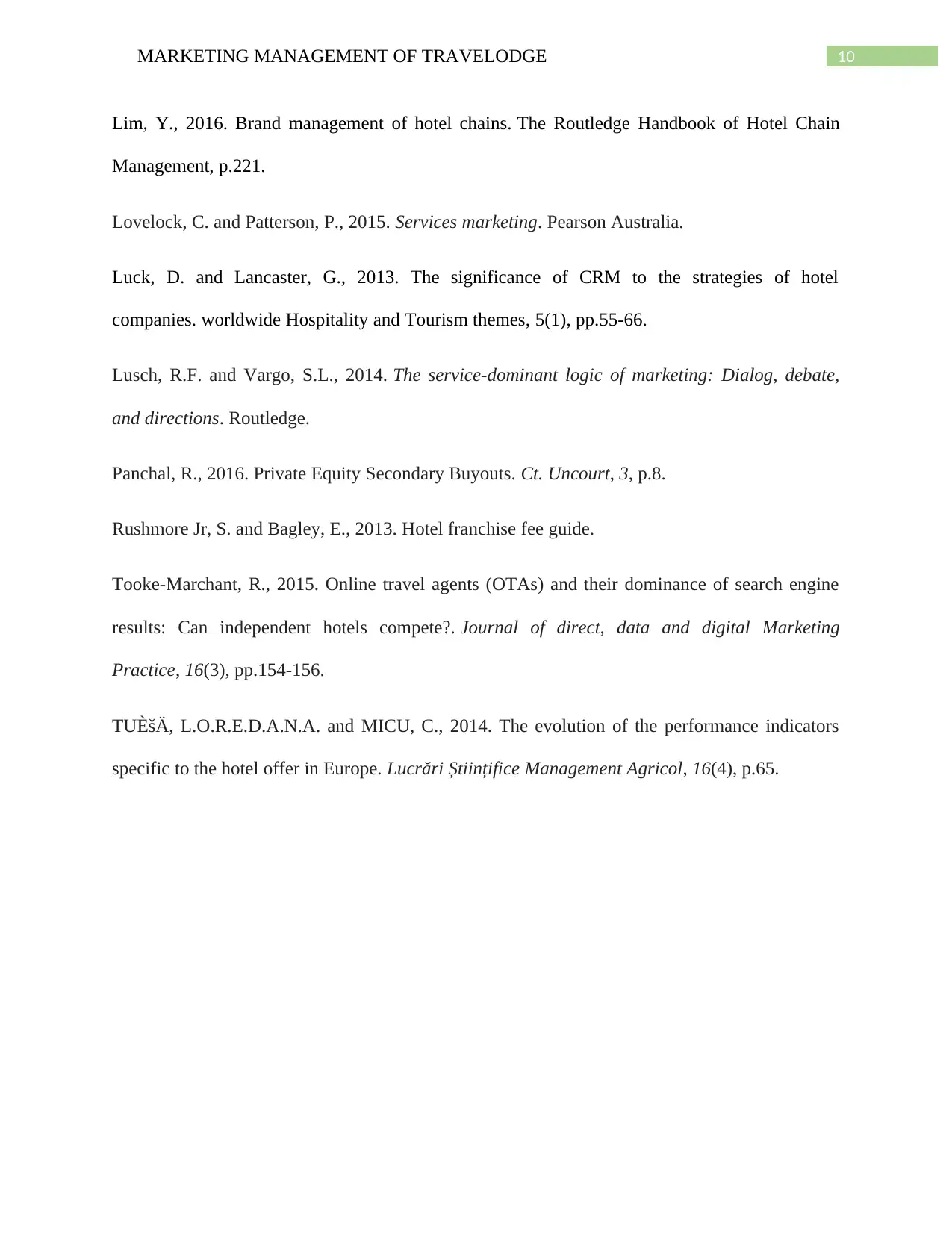
10MARKETING MANAGEMENT OF TRAVELODGE
Lim, Y., 2016. Brand management of hotel chains. The Routledge Handbook of Hotel Chain
Management, p.221.
Lovelock, C. and Patterson, P., 2015. Services marketing. Pearson Australia.
Luck, D. and Lancaster, G., 2013. The significance of CRM to the strategies of hotel
companies. worldwide Hospitality and Tourism themes, 5(1), pp.55-66.
Lusch, R.F. and Vargo, S.L., 2014. The service-dominant logic of marketing: Dialog, debate,
and directions. Routledge.
Panchal, R., 2016. Private Equity Secondary Buyouts. Ct. Uncourt, 3, p.8.
Rushmore Jr, S. and Bagley, E., 2013. Hotel franchise fee guide.
Tooke-Marchant, R., 2015. Online travel agents (OTAs) and their dominance of search engine
results: Can independent hotels compete?. Journal of direct, data and digital Marketing
Practice, 16(3), pp.154-156.
TUÈšÄ, L.O.R.E.D.A.N.A. and MICU, C., 2014. The evolution of the performance indicators
specific to the hotel offer in Europe. Lucrări Științifice Management Agricol, 16(4), p.65.
Lim, Y., 2016. Brand management of hotel chains. The Routledge Handbook of Hotel Chain
Management, p.221.
Lovelock, C. and Patterson, P., 2015. Services marketing. Pearson Australia.
Luck, D. and Lancaster, G., 2013. The significance of CRM to the strategies of hotel
companies. worldwide Hospitality and Tourism themes, 5(1), pp.55-66.
Lusch, R.F. and Vargo, S.L., 2014. The service-dominant logic of marketing: Dialog, debate,
and directions. Routledge.
Panchal, R., 2016. Private Equity Secondary Buyouts. Ct. Uncourt, 3, p.8.
Rushmore Jr, S. and Bagley, E., 2013. Hotel franchise fee guide.
Tooke-Marchant, R., 2015. Online travel agents (OTAs) and their dominance of search engine
results: Can independent hotels compete?. Journal of direct, data and digital Marketing
Practice, 16(3), pp.154-156.
TUÈšÄ, L.O.R.E.D.A.N.A. and MICU, C., 2014. The evolution of the performance indicators
specific to the hotel offer in Europe. Lucrări Științifice Management Agricol, 16(4), p.65.
1 out of 11
Related Documents
Your All-in-One AI-Powered Toolkit for Academic Success.
+13062052269
info@desklib.com
Available 24*7 on WhatsApp / Email
![[object Object]](/_next/static/media/star-bottom.7253800d.svg)
Unlock your academic potential
Copyright © 2020–2025 A2Z Services. All Rights Reserved. Developed and managed by ZUCOL.





